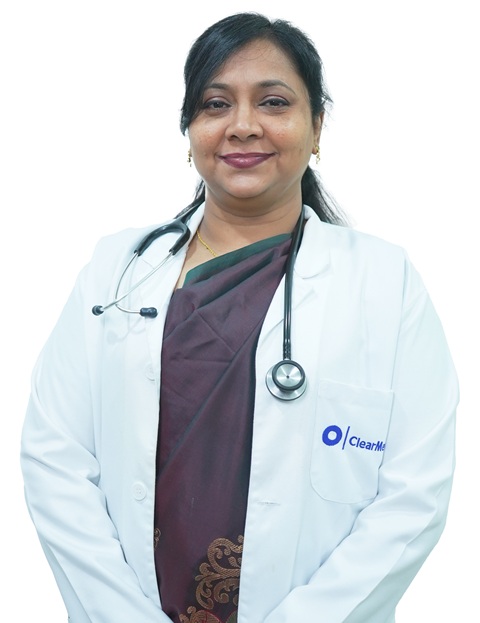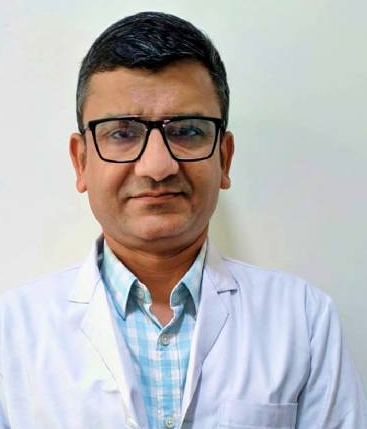How to Remove Acne Dark Spots Naturally and Fast?

Quick Summary
- Acne lesions can leave dark marks on your skin even after they have healed.
- This is due to an increase in melanin production in some skin cells, which causes a darker patch of skin.
- Darker skin tones are more prone to this condition, which is known as post-inflammatory hyperpigmentation.
You may want your pimples to heal quickly whenever you get one and to know how to remove acne dark spots. But occasionally, even after the spot has disappeared, acne lesions leave a dark mark on your skin. Although frustrating, this is common. Understanding what causes these dark spots on your skin in the first place is the first step in getting rid of them. Technically speaking, when a pimple appears on your skin, it is an instance of inflammation.
Your skin's colour is determined by melanin, and when some cells produce more melanin than others, a darker patch of skin results, Post-inflammatory hyperpigmentation is the term for this. Naturally, darker skin tones make people more vulnerable to this condition. Are you looking for an answer to how to get rid of dark spots from acne? To learn more about how to treat post-pimple dark spots and how to remove acne dark spots, keep reading.
What are Acne Dark Spots?
Before knowing how to get rid of dark spots from acne, let's learn about acne dark spots that are flat, discoloured areas on the skin that can develop after acne breakouts or other skin injuries. They can appear on any body part but are most commonly found on the face, neck, and back.
They result from excess pigment melanin (the pigment that gives colour to the skin) in the affected area, which can range in colour from light brown to black, and they may be surrounded by red or pink skin. Acne dark spots are not harmful but can be cosmetically undesirable, and people may wish to remove them for aesthetic reasons.
There are several other causes of acne dark spots. Some of these are mentioned below:
- Sun exposure: The sun's ultraviolet (UV) rays can stimulate melanin production. This can lead to dark spots, particularly in people with naturally darker skin tones.
- Hormonal changes: Hormonal imbalances can trigger excess melanin production, leading to the development of dark spots. This is often the case with melasma, which causes dark, blotchy patches on the skin, often triggered by pregnancy or certain medications.
- Ageing: As we age, our skin's ability to regenerate itself slows down, and the production of melanin increases. This can lead to the development of dark spots over time.
- Other skin injuries: Dark spots can also be caused by other skin injuries, such as cuts, scratches, or burns.


Ways to Remove Acne Dark Spots
Acne dark spots can be an unwelcome reminder of past breakouts. They occur when the skin produces excess melanin in response to inflammation caused by acne. Fortunately, there are several ways to remove or reduce the appearance of these spots, including:
- Home Remedies
- Medical Treatment
- Lifestyle Changes
Home Remedies for Acne Dark Spots
Generally, acne dark spots may go away on their own, leaving behind dark spots that are difficult to eliminate. Fortunately, several effective home remedies can help fade these dark spots and improve the overall appearance of your skin. Below mentioned are some of the top home remedies for acne dark spots.
- Lemon juice: Lemon juice is rich in citric acid, which can help to lighten dark spots by exfoliating the top layer of the skin. To use lemon juice as a home remedy for acne dark spots:
- Mix lemon juice and water in equal parts, and apply the mixture to the affected area with a cotton pad.
- Leave the mixture for 10 to 15 minutes, then rinse with water.
- Be sure to use broad-spectrum sunscreen after applying lemon juice, as it can make the skin more sensitive to the sun.
- Apple cider vinegar: Apple cider vinegar has natural astringent and exfoliating properties that can help to lighten dark spots. To use apple cider vinegar as a home remedy for acne dark spots:
- Mix apple cider vinegar and water in equal parts, and apply the mixture to the affected area with a cotton pad.
- Leave the mixture for 10 to 15 minutes, then rinse with water. ;
- Aloe vera: Aloe vera is a natural skin healer that can help to lighten dark spots and improve the overall tone and texture of the skin. To use aloe vera as a home remedy for acne dark spots:
- Apply pure aloe vera gel to the affected area and massage it gently.
- Leave the gel on for 15 to 20 minutes, then rinse with water.
- Sandalwood: Sandalwood has cooling and soothing properties that may help to reduce inflammation and lighten dark spots.
- Mix sandalwood powder with water or rose water to make a thick paste and apply it to the affected area.
- Turmeric: Turmeric is a spice with natural skin-lightening properties and can help reduce the appearance of dark spots. Below mentioned steps will help you use turmeric for dark spots,
- Mix a small amount of turmeric with water or coconut oil to paste.
- Apply the paste to the affected area, leave it on for 10 to 15 minutes, and then rinse with water.
- Vitamin E: Vitamin E is an antioxidant that can help lighten dark spots and improve the skin's overall appearance. To use vitamin E as a home remedy for acne dark spots:
- Break open a vitamin E capsule and apply the oil to the affected area.
- Massage the oil into the skin for a few minutes, then leave it on for 15-20 minutes before rinsing it with water.
- Neem: Neem has antibacterial properties that can help reduce acne and prevent further breakouts.
- Boil neem leaves in water and use the water to wash your face.
- Tulsi: Tulsi leaves have antibacterial properties that can help fight acne-causing bacteria.
- Crush fresh tulsi leaves to make a paste and apply it to your face.
- Leave it on for 10-15 minutes and rinse off with water.
Medical Treatments for Acne Dark Spots
Even after acne clears up, it can leave behind unsightly dark spots. Medical treatments for acne dark spots can help fade or eliminate discolouration, giving individuals clearer, more even-toned skin.
The given below are OTC medications:
- Retinoids: Retinoids are prescription medications that are derived from vitamin A. They work by exfoliating the top layer of the skin, which can help to fade dark spots and improve the overall tone and texture of the skin. Ordinary retinoids include tretinoin, adapalene, and tazarotene.
- Hydroquinone: Hydroquinone is a prescription skin-lightening medication inhibiting melanin production. It is available in a cream or gel form and is usually applied to the affected area once or twice a day.
- Chemical peels: Chemical peels are a type of exfoliating treatment that uses a solution to remove the top layer of the skin, revealing a new, smoother layer underneath. Chemical peels can lighten dark spots and improve the overall tone and texture of the skin. They are usually performed by a dermatologist or other skin care professional.
The given below are medical procedures:
- Laser treatments: Laser treatments can lighten dark spots and improve the overall tone and texture of the skin. Laser treatments use intense pulses of light to target and remove the top layers of the skin, revealing a new, smoother layer underneath. Several laser treatments can treat acne dark spots, including fractional laser resurfacing, non-ablative laser resurfacing, and intense pulsed light (IPL) treatments. Laser treatments are usually performed by a dermatologist or other skin care professional.
- Microdermabrasion: Microdermabrasion is a non-invasive treatment that uses a fine spray of crystals to remove the top layer of the skin, revealing a new, smoother layer underneath. It can be used to lighten dark spots and improve the overall tone and texture of the skin. Microdermabrasion is usually performed by a dermatologist or other skin care professional.
It is important to note that home remedies and medical treatments for acne dark spots may only work for some, and it may take several weeks or even months to see results. Following a consistent skincare routine and using broad-spectrum sunscreen to protect the skin from further damage is also essential. If you are still determining which treatment is best for you, it is recommended to consult with a dermatologist or other skin care professional.
Skincare Tips to Prevent Acne Dark Spots
Acne can be a frustrating skin condition, but what's even more annoying is dealing with the dark spots it leaves behind. Implementing a proper skincare routine can make all the difference if you're tired of battling acne and its pesky dark spots.
- Avoid picking or squeezing pimples to prevent further inflammation and hyperpigmentation.
- Use gentle skincare products and avoid over-exfoliating to prevent irritation and worsen hyperpigmentation.
- Cleansing your skin twice daily can help remove oil, dirt and other impurities that can clog pores and cause breakouts.
- Regular exfoliation can help remove dead skin cells contributing to dull, uneven skin tone.
- Using a moisturizer can help hydrate your skin and protect it from environmental stressors that can cause damage.
- Use products with skin-lightening ingredients, such as glycolic acid or kojic acid, to fade dark spots over time.
- Applying a broad-spectrum sunscreen with at least SPF 30 can help protect the skin from the harmful UV rays that can cause premature ageing and skin cancer and prevent further hyperpigmentation.
- Consult a dermatologist for professional treatment options, such as chemical peels or laser therapy.
Lifestyle Habits and Skincare Routines
Maintaining healthy skin requires a combination of good lifestyle habits and an effective skincare routine. While skincare products can help improve the appearance of your skin, they can only do so much if you don't take care of your body and mind. Let us discuss the importance of lifestyle habits and skincare routines in achieving healthy, glowing skin.
- Hydration: Drinking enough water is essential for keeping your skin hydrated and healthy-looking.
- Diet: Eating a balanced diet with plenty of fruits and vegetables can give your skin essential vitamins and minerals.
- Exercise: Regular physical activity can improve circulation and help flush toxins out of your body, leading to clearer skin.
- Sleep: Getting enough restful sleep is vital for allowing your body to repair and regenerate, which can help keep your skin looking youthful.
- Stress management: Stress can trigger breakouts and other skin issues, so finding ways to manage stress, such as meditation or yoga, can benefit your skin and overall health.
When to Seek Medical Attention?
When caring for your skin, lifestyle habits and skincare routines are crucial in maintaining health and appearance. However, in some cases, seeking medical attention may be necessary to address specific skin issues. Here are some signs that indicate you should consult a dermatologist:
- Persistent acne: If your acne persists despite following a consistent skincare routine and lifestyle changes, it may be time to seek professional help. A dermatologist can prescribe medications or offer treatments like chemical peels, laser therapy, or extractions to clear up acne.
- Unusual moles or skin growths: A dermatologist must check out any new or changing moles or skin growths. Skin cancer can be easily treated when caught early, so it's essential to be vigilant and seek medical attention promptly.
- Chronic dryness or itchiness: If you experience chronic dryness or itchiness despite using moisturizers and other skincare products, it could be a sign of underlying skin issues like eczema or psoriasis. A dermatologist can diagnose and treat these conditions effectively.
- Skin discolouration: Observation of skin patches significantly lighter or darker than your normal skin tone. It could be a sign of a skin condition like vitiligo or hyperpigmentation. A dermatologist can help you determine the cause and recommend appropriate treatment options.
If you're concerned about skin issues, it's always best to consult a dermatologist. They can offer personalized recommendations and treatments to help you achieve healthy, radiant skin.
Takeaway
In conclusion, removing dark acne spots requires a combination of patience and consistent effort. Using skincare products with brightening ingredients, such as vitamin C and niacinamide, and protecting your skin from UV rays can help fade dark spots over time. Additionally, lifestyle habits such as maintaining a healthy diet and managing stress can also contribute to clearer, more even-toned skin.
By paying attention to your body and mind and using the right skincare products, the appearance and health of your skin can be improved for years to come. If you or your loved ones have doubts about how to remove acne dark spots, contact our team of experts at HexaHealth. Our expert team of doctors can consult you and treat you properly. Get in touch with us TODAY!
Frequently Asked Questions
How to remove acne dark spots?
To remove acne dark spots, using skincare products with brightening ingredients, such as vitamin C, niacinamide, and alpha-hydroxy acids (AHAs), can help fade dark spots over time. Protecting your skin from UV rays with sunscreen or protective clothing is essential to prevent further darkening. In-office treatments like chemical peels, microdermabrasion, or laser therapy can also be effective.
How to clear acne scars and dark spots naturally?
Natural remedies to help clear acne scars and dark spots include applying aloe vera, honey, or green tea to the affected areas. Exfoliating with baking soda or sugar scrub can also help remove dead skin cells and promote skin cell turnover. However, it's important to note that natural remedies may not be as effective as medical treatments and can take longer to see results.
What is the best treatment to get rid of dark spots from acne?
The best treatment to eliminate dark spots from acne will depend on the severity of the scarring and individual skin type. Medical treatments such as chemical peels, microdermabrasion, or laser therapy can be highly effective in reducing the appearance of dark spots. Topical creams or serums containing brightening ingredients like hydroquinone, retinoids, vitamin C, and niacinamide can also be effective.
Do dark spots from acne go away?
Dark scars from acne can fade with brightening skincare products and protection from UV rays. In some cases, the dark spots may vanish altogether. However, more profound and severe scarring may not completely disappear with topical treatments alone. It may require in-office treatments such as chemical peels or laser therapy for more significant improvement.
What causes acne dark spots?
Acne dark spots, also known as post-inflammatory hyperpigmentation (PIH), are caused by an overproduction of melanin in the skin in response to inflammation from acne. When the skin is inflamed, it triggers excess melanin production, leading to discolouration and dark spots.
How long do dark acne marks take to fade?
The time it takes for dark acne marks to fade can vary depending on the individual and the severity of the discolouration. Mild cases may fade within a few weeks or months, while more severe cases can take several months or even years to fade completely.
How can I lighten my dark spots from acne?
There are several ways to lighten dark spots from acne, including:
- Using skincare products with brightening ingredients such as vitamin C, niacinamide, and kojic acid.
- Applying topical treatments such as hydroquinone, retinoids, and azelaic acid.
- Exfoliating regularly with products that contain alpha or beta hydroxy acids.
- Protecting your skin from UV rays by wearing sunscreen with at least SPF 30.
Why are my dark spots from acne not fading?
Dark spots from acne may not fade for several reasons, including:
- Continued exposure to UV rays without protection.
- Not using the right skincare products or using them inconsistently.
- Genetics or hormonal imbalances.
- More severe cases of PIH require professional treatment, such as chemical peels or laser therapy.
- Underlying medical conditions such as diabetes or lupus.
Why do my pimples leave dark spots?
Pimples can leave dark spots or hyperpigmentation due to the inflammation caused by acne. When a pimple forms, the skin becomes inflamed, and the body produces excess melanin, which can lead to dark spots or discolouration.
How do you get rid of dark spots in 3 days?
It may not be possible to eliminate dark spots in just three days, but there are some things you can do to help fade them. Using skincare products with brightening ingredients, such as vitamin C or kojic acid, can help improve the appearance of dark spots over time. Applying sunscreen with at least SPF 30 can also help prevent further skin darkening.
How do you permanently fade dark spots?
To permanently fade dark spots, it's essential to maintain a consistent skincare routine that regularly uses brightening ingredients such as retinol, vitamin C, and niacinamide. Protecting your skin from UV rays is crucial in preventing further skin darkening. In a few cases, professional treatments such as chemical peels or laser therapy may be recommended by a dermatologist.
How to clear dark acne spots fast?
While it may not be possible to remove dark acne spots overnight, consistent use of skin care products with brightening ingredients such as vitamin C, glycolic acid, and azelaic acid can help improve the appearance of dark spots over time. Additionally, wearing sunscreen daily and avoiding picking at or squeezing acne can prevent further darkening and scarring of the skin.
Last Updated on: 13 March 2023
Reviewer

Dr. Priyanka Sharma
MBBS, DNB Plastic Surgery, Training in Hand and Microvascular Surgery, Training in Hair Transplant
15 Years Experience
Dr Priyanka Sharma is a highly regarded Plastic, Reconstructive, and Aesthetic Surgeon with over 15 years of experience.
She is currently associated as a Consultant with:<...View More
Author

Charu Shrivastava
BSc. Biotechnology I MDU and MSc in Medical Biochemistry (HIMSR, Jamia Hamdard)
3 Years Experience
Skilled in brand marketing and SEO-driven medical content that educates and engages patients, healthcare professionals, and the general public. With medical writing and proofreading expertise, she ensures accuracy,...View More
Expert Doctors (10)
NABH Accredited Hospitals (5)
Latest Health Articles
Related Treatments























 Open In App
Open In App